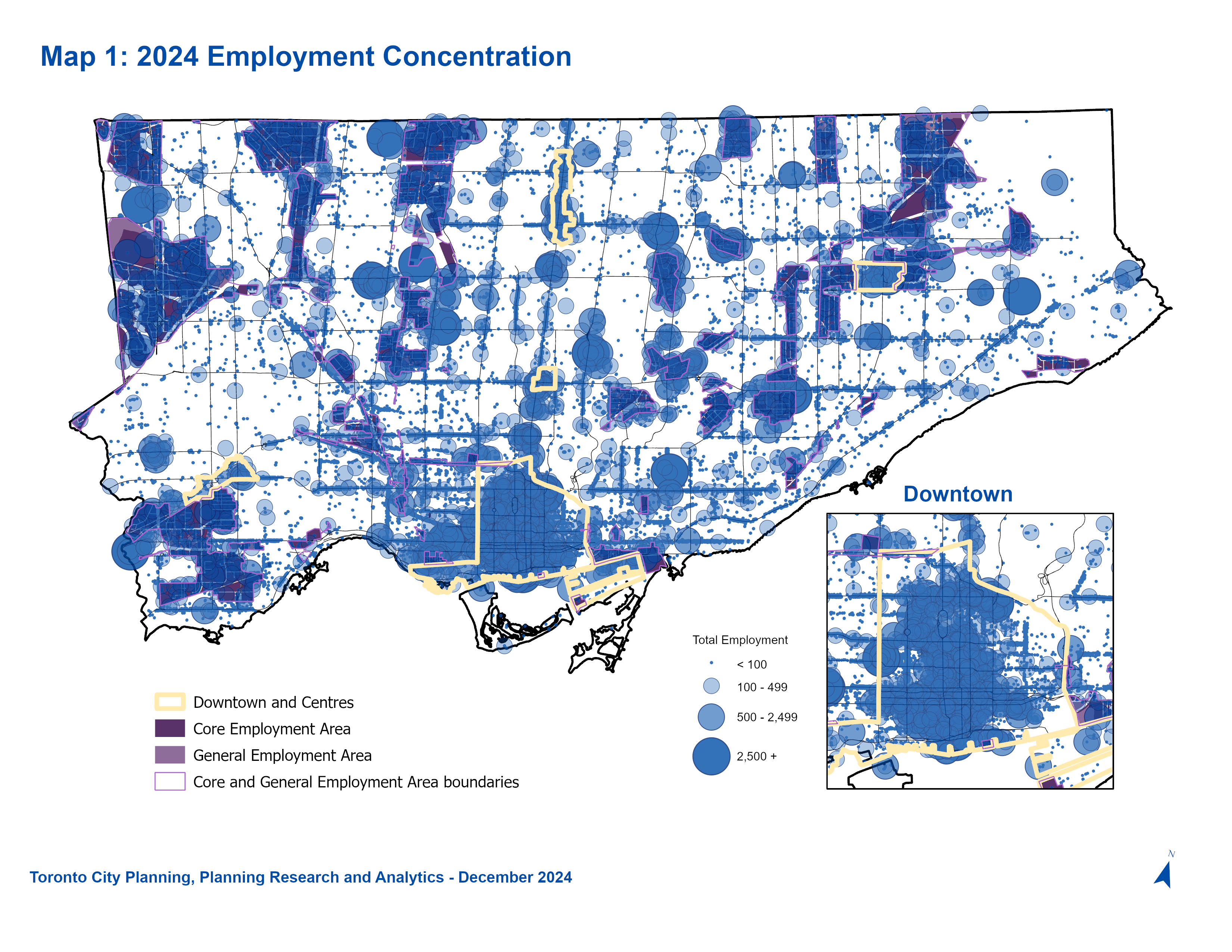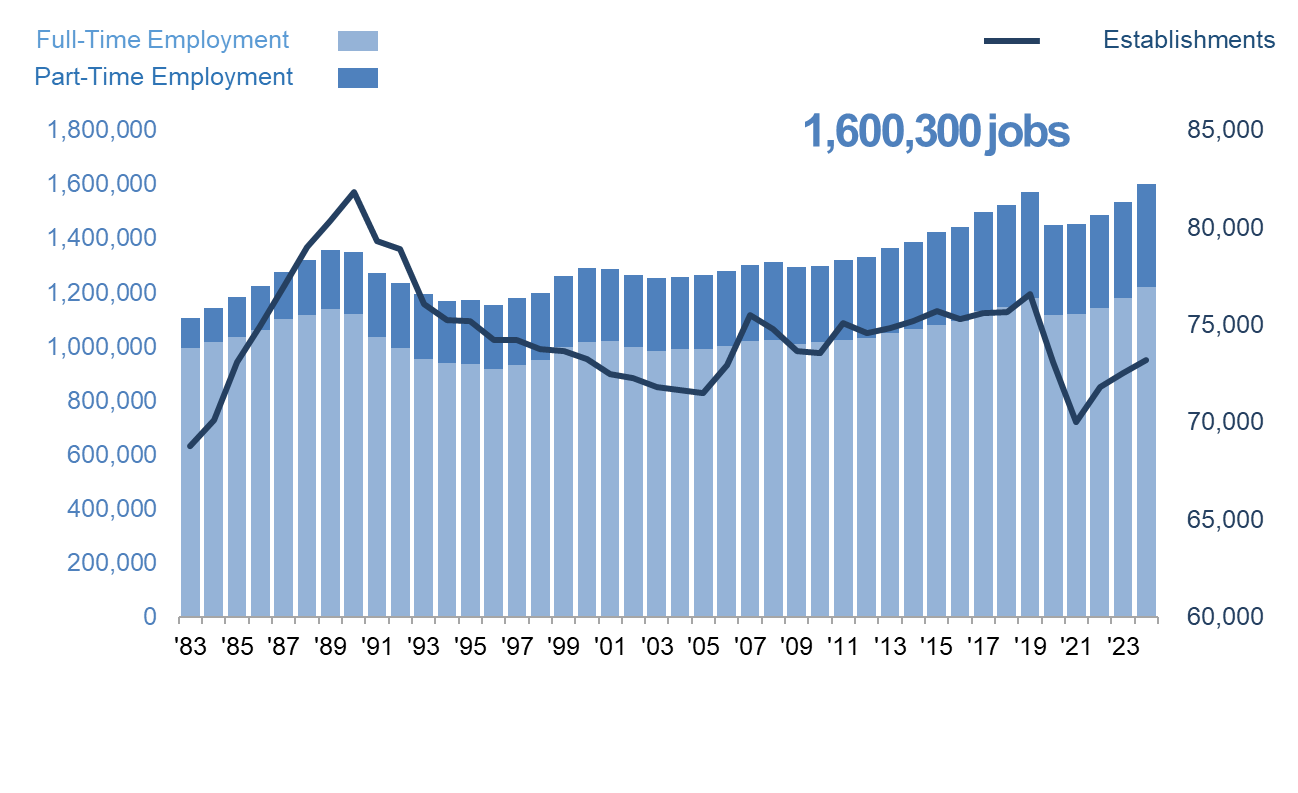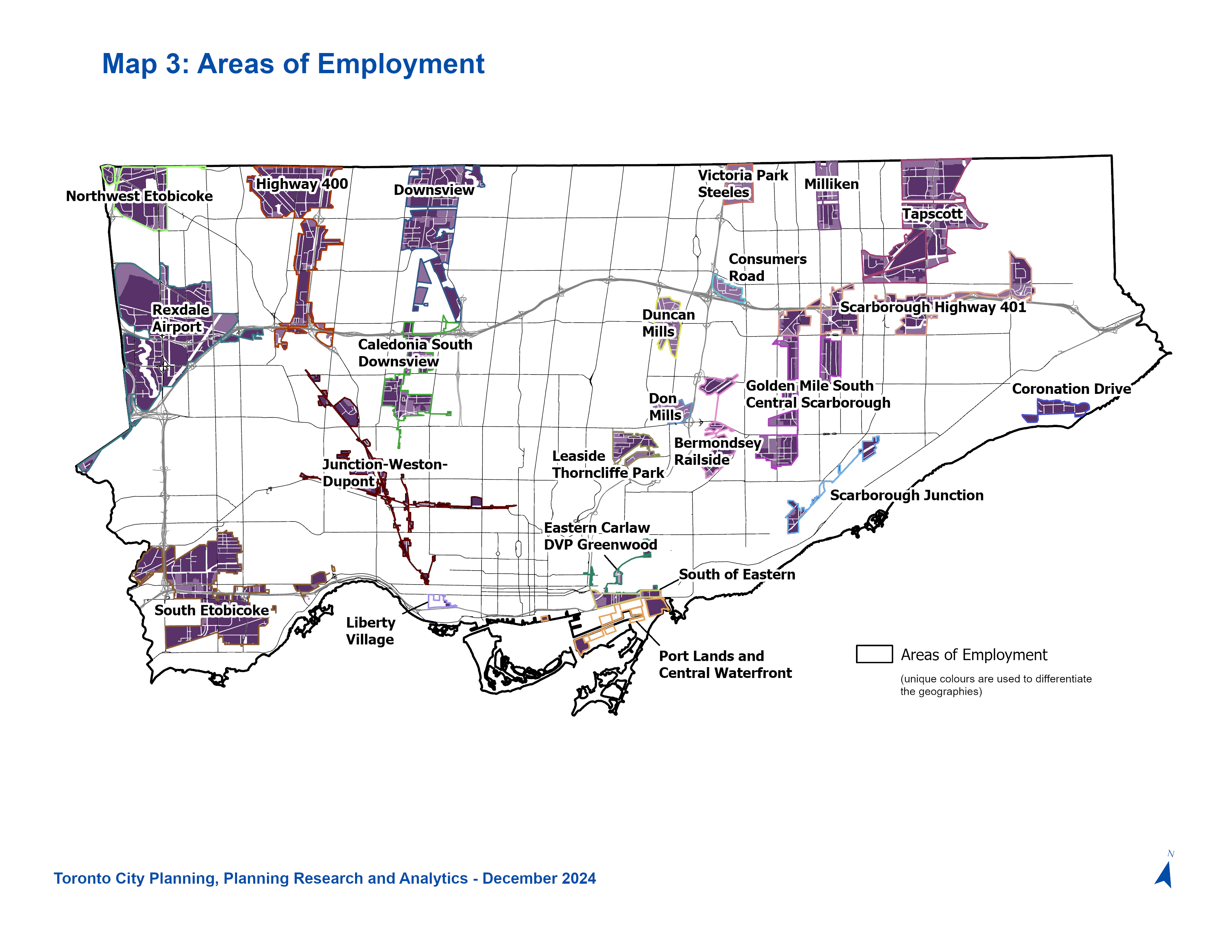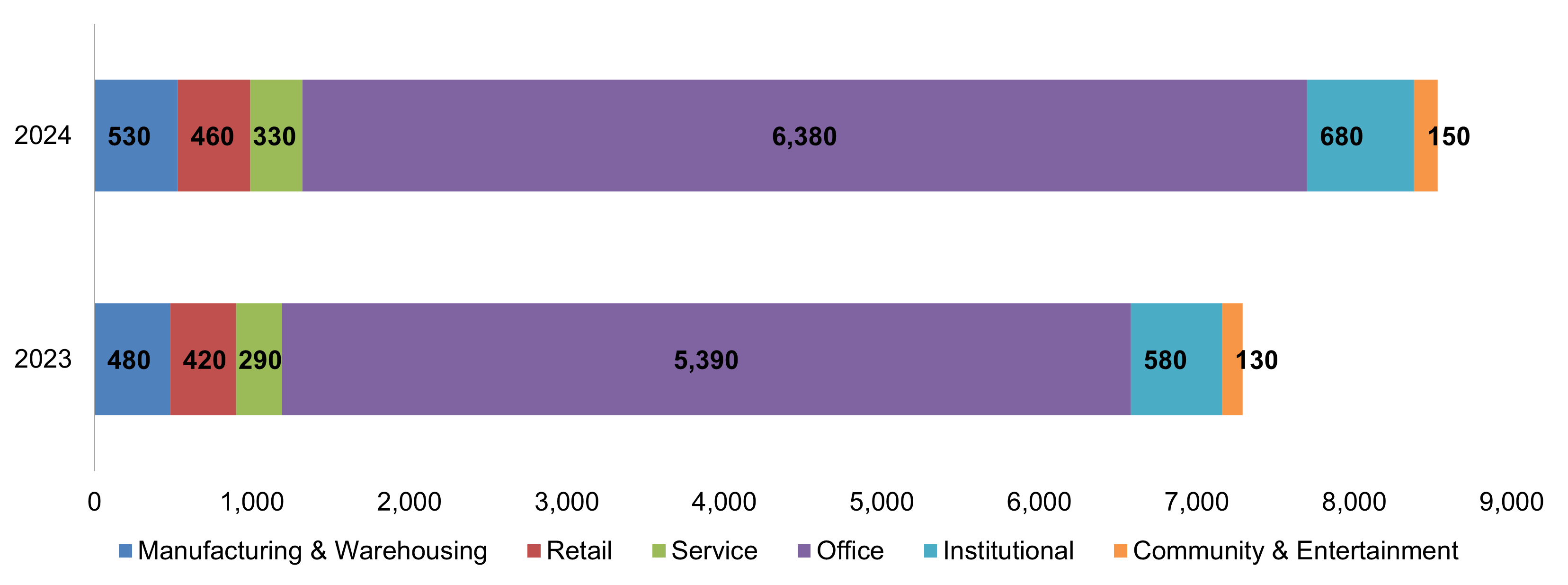The 2025 Toronto Employment Survey is now live. All responses will be kept confidential.
Since 1983, Toronto has monitored the City’s employment by conducting an annual survey of businesses. The data collected is vital to monitor the City’s economic health, as well as aiding in decision and policy making. It is essential background information for forecasting and planning the City’s infrastructure and services for the citizens and businesses of Toronto. The Survey is a unique resource in Canada for the private and public sectors.
How the Survey Works
Throughout the summer, surveyors visit each and every business establishment in the City of Toronto. That’s over 73,180 locations. The surveyors collect information about the number of employees working there, and the type of work that is taking place. No other programme relates Toronto employment and land use.
Your Information is Confidential
The information collected is treated as strictly confidential. The data is only released to the public in aggregate form. This allows employment patterns to be studied without revealing specific information on individual businesses.
We Need You
The continued success of this important survey depends on the co-operation and assistance of the City’s business community. We rely on each business establishment to provide us with information on the number of full- and part-time employees as well as the type of employment activity taking place at each location.
Watch out for a surveyor at your business this summer and count your business in.
2024 Survey Results
The 2024 Employment Bulletin summarizes the results of the 42nd annual Toronto Employment Survey and provides an analysis of changes in Toronto’s economy over the past decade. The bulletin reports on key employment trends by sector, and on evolving employment patterns across the city and in Downtown, the Districts, Centres, Secondary Plan areas, Employment Areas, and Areas of Employment.
Toronto Employment Concentration, 2024

Highlights
- The Toronto Employment Survey counted 1,600,300 jobs in 2024.
- In 2024, the Toronto Employment Survey recorded a 4.2 per cent increase in total jobs, up 65,010 jobs. This is the highest growth rate measured in the last two decades.
- Total employment has surpassed the pre-COVID-19 pandemic total of 1,569,800 in 2019, a difference of 30,500 or 1.9 per cent.
- Full-time employment increased by 39,310 jobs (3.3 per cent) from 2023 to 1,218,680 jobs.
- Part-time employment increased by 25,710 jobs (7.2 per cent) from 2023 to 381,620 jobs.
- In 2024, the Survey counted 73,180 establishments, a net increase of 650 or 0.9 per cent.
- A total of 6,430 establishments were new to the city in 2024. Of these, 1,870 are located in Employment Areas (29.1 per cent), 1,520 in Downtown (23.6 per cent), 320 in the Centres (4.9 per cent), and 2,730 (42.4 per cent) in the rest of the city.
- The Office category continues to make up the largest share of Toronto employment, with 49.3 per cent of jobs, up from 47.9 per cent a decade ago, demonstrating the continued importance of the Office category to Toronto’s economy.
- There were 643,350 jobs in Toronto’s Downtown in 2024, the highest employment count reported in the last five years.
- Over half of jobs citywide (52.3 per cent) are located in Toronto and East York District. This is followed by North York (19.5 per cent), Etobicoke York (16.0 per cent) and Scarborough (12.2 per cent).
- The four Centres had an increase of 3.5 per cent in 2024 amounting to 76,300 jobs or 4.8 per cent of the city’s total employment.
- Employment Areas contained 387,760 jobs, 24.2 per cent of the city total. This is down 10,150 jobs or 2.6 per cent from last year.
- Secondary Plan areas account for 916,770 jobs or 57.3 per cent of all citywide employment, a 6.3 per cent increase from last year.
- Areas of Employment accounted for 410,380 jobs, or 25.6 per cent of all citywide employment.
Total Employment in City of Toronto, 1983-2024

Total Employment – 2014, 2023, 2024
| Employment |
Total Number of Employees |
Net Change |
% Change |
Net Change |
% Change |
|
2014 |
2023 |
2024 |
2014-2024 |
2023-2024 |
| Full-time |
1,063,550 |
1,179,370 |
1,218,680 |
155,130 |
14.6% |
39,310 |
3.3% |
| Part-time |
320,860 |
355,910 |
381,620 |
60,760 |
18.9% |
25,710 |
7.2% |
| Total |
1,384,390 |
1,535,290 |
1,600,300 |
215,910 |
15.6% |
65,010 |
4.2% |
Source:City of Toronto, City Planning, Planning Research and Analytics
Note: Numbers have been rounded to the nearest ten. Totals and sums may differ due to rounding.
Areas of Employment
- According to the Planning Act, an “‘area of employment’ means an area of land designated in an official plan for clusters of business and economic uses”. These uses include manufacturing, uses related to research and development in connection with manufacturing, warehousing, associated retail and office uses, and ancillary facilities. There are 23 Areas of Employment (AOEs) in Toronto which represent geographic clusters of lands designated as either Core Employment Area or General Employment Area in the Official Plan.
- In 2024, employment in AOEs accounted for 410,380 jobs, or 25.6 per cent of all citywide employment, and 22,040 establishments, or 30.1 per cent of the total.
- The top five AOEs, Rexdale-Airport, South Etobicoke, Downsview, Highway 400, and Tapscott, comprise nearly half of the employment with 187,670 jobs.
- The Manufacturing sector remains the largest source of jobs within AOEs with 74,990 jobs in 2024, despite a decline of 6,360 jobs since 2019.
Map 3: Areas of Employment

Hybrid Work
- In 2024, the response rate for questions related to remote work was higher than previous years.
- The percentage of staff working remotely remained constant at 32.5 per cent, signalling a stabilizing of hybrid work arrangements in Toronto.
- One in four businesses that adopted a hybrid work model reported having employees work on-site three days a week on average, showing no change between 2023 and 2024.
- Geographically, Downtown Toronto has the largest proportion of remote workers in the City. Downtown has seen an increase of 45,000 remote employees along with an increase of 600 remote work businesses. The proportion of “remote work” employees in Downtown has continued to increase from 55.5 per cent in 2023 to 63.6 per cent in 2024.
Number of Establishments Reporting Remote Work Employment by Category, 2023-2024

Job Precarity
- Part-time workers may be more susceptible to fluctuations in the economy with larger job losses and slower recovery than more stable full-time jobs. The 2024 count of 381,620 part-time jobs is still below the 2019 peak of 390,850 part-time jobs.
- Community and Entertainment jobs and Service jobs were most impacted by the COVID-19 pandemic, losing 35.8 per cent and 23.4 per cent of jobs respectively in 2020. Community and Entertainment part-time employment increased by 23.8 per cent from 2023, and Service part-time employment increased by 7.1 per cent, but both are still below 2019 employment numbers.
|
Total Number of Part-time Employees |
Net Change |
% Change |
| Category |
2023 |
2024 |
2023-2024 |
| Manufacturing & Warehousing |
9,750 |
9,500 |
-250 |
-2.6% |
| Retail |
68,620 |
68,980 |
360 |
0.5% |
| Service |
65,030 |
69,660 |
4,630 |
7.1% |
| Office |
90,810 |
95,110 |
4,300 |
4.7% |
| Institutional |
96,460 |
107,110 |
10,650 |
11.0% |
| Community & Entertainment |
25,240 |
31,250 |
6,010 |
23.8% |
| Total |
355,910 |
381,620 |
25,710 |
7.2% |
Source:City of Toronto, City Planning, Planning Research and Analytics
Note: Numbers have been rounded to the nearest ten. Totals and sums may differ due to rounding.
Survey Results from Previous Years
For copies of Employment Bulletins from 2003 to 2023, please contact Hailey Toft by telephone at 416-392-8343 or by email at cityplanning@toronto.ca.
Toronto Employment Survey Summary Tables for 2016 to 2020 are available on the Open Data Catalogue.
